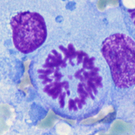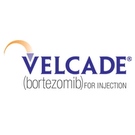Articles tagged with: Velcade
News»

The U.S. Food and Drug Administration has approved a Phase 3 clinical trial evaluating perifosine in relapsed and refractory multiple myeloma patients. Perifosine, also known as KRX-0401, is an oral anti-cancer agent being developed by Aeterna Zentaris and licensed in the U.S., Canada, and Mexico by Keryx Biopharmaceuticals.
The trial, entitled “A Phase 3 Randomized Study to Assess the Efficacy and Safety of Perifosine Added to the Combination of Bortezomib and Dexamethasone in Multiple Myeloma Patients Previously Treated with Bortezomib,” will evaluate the safety and efficacy of perifosine, compared to placebo, when …
News, Resources»

Kidney failure, which affects 20 percent of all multiple myeloma patients, is a serious complication that can lead to permanent kidney impairment and continued reliance on dialysis. However, a wide range of treatment options is available to myeloma patients experiencing kidney failure. Successful treatment methods include rehydration, correction of hypercalcemia (a condition that results in high serum calcium levels), and discontinuation of non-steroidal, anti-inflammatory drugs (such as aspirin or ibuprofen), that reduce blood flow to the kidneys.
A common complication found in myeloma patients experiencing kidney failure is hypercalcemia, a disorder that …
News»

Researchers have announced that current clinical treatment guidelines do not adequately incorporate quality of life considerations and are calling for increased attention to the “patient perspective” in myeloma treatment.. Presently, few studies have examined quality of life issues. For those that have, their results have often failed to have a meaningful effect on clinical decision-making.
A study in the European Journal of Haematology identified 15 high-quality clinical trials since 1990 that included quality of life as a principal focus. These studies examined the impact of various myeloma treatments and therapeutic interventions on …
News»

The paired use of novel drug agents and autologous stem cell transplantation (ASCT) may not be as effective as formerly believed, according to the June issue of the journal Blood.
Treatment for multiple myeloma commonly integrates high dose therapy of novel drug agents with ASCT. However, an article printed in Blood shows that initial treatment with Revlimid (lenalidomide), one of the novel drug agents, corresponds with inhibition of stem cell mobilization and collection for ASCT.
The introduction of novel drug agents, including thalidomide (Thalomid), Revlimid, and Read the full story »
News»

The European Journal of Haematology has announced that researchers have found a Velcade (bortezomib) and dexamethasone (Decadron) combination is highly effective in relapsed and refractory multiple myeloma patients. The study authors caution, however, that the treatment responses appear relatively short-lived.
In the present study, 70 relapsed or refractory myeloma patients–that is, patients whose disease has not responded to previous therapies–received either Velcade alone or a Velcade-dexamethasone combination. The treatments were not equally divided, however, and 87 percent of the patients received the combination therapy.
During treatment, 59 percent of patients …
News»

A recent Phase 2 study, presented at the European Hematology Association (EHA) meeting, showed that a regimen of Velcade (bortezomib), dexamethasone (Decadron), and doxorubicin (Adriamycin), or VDD, resulted in improved kidney impairment in multiple myeloma patients.
Multiple myeloma patients often face kidney complications including acute light chain induced renal failure (ARF). ARF is a serious complication that can lead to permanent kidney dysfunction and reliance on continual hemodialysis. A normal kidney produces urine for excretion but reabsorbs proteins so they do not leave the body. Anti-myeloma therapy that prevents …
News»
An American Society of Clinical Oncology (ASCO) meeting abstract describes initial results from an ongoing Phase 2 study of romidepsin combined with Velcade (bortezomib) for patients with relapsed or refractory myeloma.
Romidepsin is a histone deacetylase inhibitor (HDACi). An HDACi is a compound that disrupts the function of enzymes called histone deacetylases, which contribute to the spread of myeloma.
Laboratory studies have determined that HDACis such as romidepsin significantly reduce the growth of myeloma cells. Additionally, HDACis can enhance the toxic effect of Velcade on myeloma cells.
According to the …

